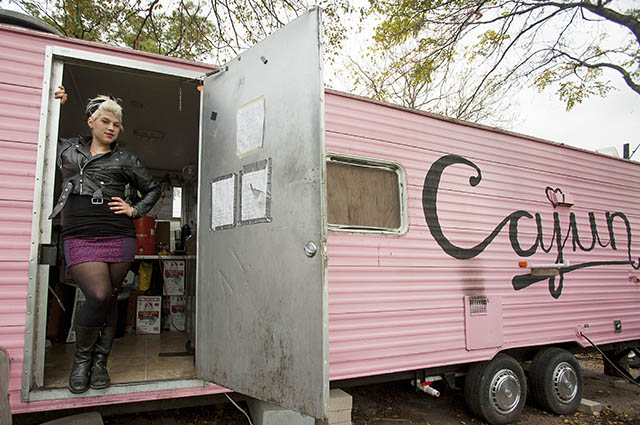Austin’s Rules Block Recycling, Composting at Food Trailers

Lynzy Moran, owner and chef at Baton Creole, stands in her food truck located on East 6th St. in Austin, Texas. Photo by Gabriel Cristóver Pérez
By Barbara Zinckernagel
For Reporting Texas
Food trailer operators who want to help Austin make progress toward its zero-waste goal are running into trouble over health and zoning regulations that haven’t kept pace with the evolving food business.
That evolution has happened quickly: Since 2006, the number of registered mobile food vendors in Austin has grown from 648 to about 1,600, according to Carole Barasch, spokeswoman for the Austin-Travis County Health and Human Services Department.
If food trailers in Austin keep permanent containers for recycling, composting or collecting other reusable waste, they risk a citation from the city Health or Code Compliance departments, mainly because they are supposed to be completely mobile at all times. The city has not adapted rules designed for mobile food trucks to fully equipped kitchens in trailers that mostly stay in the same place.
Because most food court landlords provide only a dumpster, the trailer operators are left to cart off their collections each day or give up and throw everything in the trash.
The city’s Zero Waste Advisory Commission and a few private composting and recycling entrepreneurs are taking the first steps toward solving the problem. All agree that the solution will require a comprehensive rewrite of city regulations.
Food trailers generate five types of waste: trash, grease, gray water from kitchen drains, recyclable materials and organic materials suitable for composting. Lynzy Moran, who owns Baton Creole at the Eastside Eats court on East Sixth Street, has problems with four of them.
“I have called the city, and they won’t supply me with a recycling container, so now I sometimes have to throw it away if I don’t have time to take care of it,” Moran said in a recent interview. “And I got written up for a warning citation by the health inspector when I was composting. I also had a grease trap that recycled into biodiesel, and they made me get rid of that, too.”
Moran said she now has to haul everything except trash to a kitchen commissary. “I have to travel with hot oil in my car all the way up north to my commissary,” she said. “I also have to load up my trailer with buckets of grey water and drive that up there.”
Representatives of the Health Department said they are frustrated with the situation.
“There is a lack of compliance and a lack of fitting rules. It causes all kinds of problems, but we can’t just ignore the code,” said Vincent Delisi, assistant division manager of environmental health services.
While acknowledging that trailer operators had been cited, Delisi said he couldn’t identify how many have run into problems because city records don’t distinguish between trailers and other types of businesses. “We haven’t shut anybody down for those reasons—just made them stop,” Delisi added.
According to the Zero Waste Master Plan the City Council adopted, universal recycling and composting requirements will be phased in by 2016, and those waste diversion strategies are already encouraged. The plan’s goal is to reduce trash sent to landfills by 90 percent by 2040.
Cathy Gattuso, co-chair of the Zero Waste Advisory Commission, said it can’t happen without allowing and ultimately requiring food trailers to do their part. On Oct. 9, the commission recommended that the City Council rewrite the trailer rules as soon as possible. The council has not yet taken up the matter.
No one, including Gattuso, has a specific strategy for the future of food trailer regulation.
Meanwhile, the reports of problems pile up.
Jason Burroughs owns GreenDiesel Fuels, which picks up grease from restaurants and turns it in to biodiesel. He has few food trailer customers because they keep getting stopped by the city, Burroughs said: “Now some just throw it in the trash or down the drain.”
Jeff Paine owns and runs the composting company Break It Down and serves on the Zero Waste Advisory Commission. Paine has experienced similar frustrations.
“Kebabalicious on Congress and Seventh Street and Patika Coffee were recycling and composting with my company, but I had to stop service because of health inspections. In my opinion, health inspectors are pretty random as far as enforcing this. Some of our clients have recycled for years. Others, like Kebabalicious—not so lucky,” he wrote in an email.
Burroughs doesn’t foresee a quick resolution to the problem.
“It’s just talk so far,” he said. “No one is taking leadership on a comprehensive strategy.” Burroughs said he is working on a draft that he will propose to the city.
Any comprehensive strategy would involve four city departments. Health worries about hygiene, rodents and pests and makes regular inspections. Planning Development and Review determine how a site may be used. Code Compliance enforces building and safety regulations and gets involved only if someone complains. Resource Recovery works out ways to divert waste from landfills.
At the Zero Waste Advisory meeting in October, Greg Guernsey, director of Planning and Development Review, assessed the issue from a code compliance and zoning perspective.
Zoning regulations do not prohibit food trailers from having waste containers, but because the trailers are categorized as mobile, there is also no provision for permanent recycling or composting structures on the grounds where they are parked, he said.
At the same meeting, Jessica King, manager of strategic initiatives at Austin Resource Recovery, cited one example of the problems trailer operators face: The Health Department can’t allow waste containers to be too close to food preparation, while zoning regulations require that waste containers be attached to the trailer — which often puts them too close to food prep.
“That is what is creating a conflict,” King said.